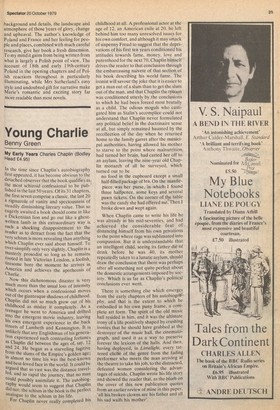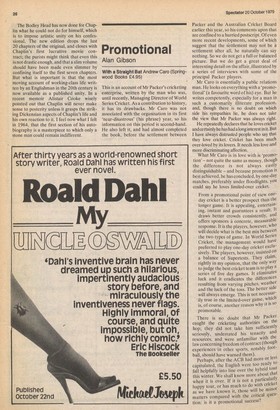Young Charlie
Benny Green
My Early Years Charles Chaplin (Bodley Head £4.95) In the time since Chaplin's autobiography first appeared, it has become obvious to the detached observer that the book qualifies as the most schizoid confessional to be published in the last 50 years. Of its 31 chapters, the first seven comprise a classic, the last 20 a rigmarole of vanity and speciousness of steadily diminishing literary value. That so eagerly awaited a book should come in like a Dickensian lion and go out like a ghostWritten lamb in this extraordinary way is such , a shocking disappointment to the reader as to detract from the fact that the very schism is more revealing than anything Which Chaplin ever said about himself. To over-simplify only very slightly. Chaplin is a masterly prosodist so long as he remains rooted in late Victorian London, a foolish, tiresome bore the moment he arrives in America and achieves the apotheosis of Charlie.
Now this dichotomous disaster is very much more than the usual loss of intensity Which occurs when a confessional moves out of the giantesque shadows of childhood. Chaplin did not so much grow out of his childhood as mislay it completely. As a teenager he went to America and drifted into the emergent movie industry, leaving his own emergent experience in the back streets of Lambeth and Kennington. It is unlikely that any Englishman of his generation experienced such contrasting fortunes as Chaplin did between the ages of, say, 12 and 24. He began as a starveling fugitive from the slums of the Empire's golden age; in almost no time his was the best-known and best-loved face in the world. It could be argued that so vast was the distance travelled, and so rapid the journey, that no man could possibly assimilate it. The autobiogr_,aPhY would seem to suggest that Chaplin did not; the schism in the book is the perfect analogue to the schism in his life. For Chaplin never really completed his childhood at all. A professional actor at the age of 12, an American exile at 20, he left behind him too many unresolved issues for his own comfort, and although it may smack of sixpenny Freud to suggest that the depri vations of his first ten years conditioned his attitudes towards fame, money, love and parenthood for the next 70, Chaplin himself drives the reader to that conclusion through the embarrassing naivete of that section of his book describing his world fame. The ironist will savour the joke that it is easier to get a man out of a slum than to get the slum out of the man, and that Chaplin the tycoon was conditioned utterly by the conclusions to which he had been forced most brutally as a child. The odious. moguls who castigated him as Stalin's accomplice could not understand that Chaplin never formulated any political belief in the doctrinaire sense at all, but simply remained haunted by the recollection of the day when he returned home to the family garret after the municipal authorities, having allowed his mother to starve to the point where malnutrition had turned her brain, had carted her off to an asylum, leaving the nine-year old Chaplin monarch of all he surveyed, which turned out to be no food in the cupboard except a small half-filled package of tea. On the mantle.piece; was her purse, inwhichl I found three halfpence, some keys and several pawn tickets. On the corner of the table was the candy she had offered me. Then I broke down and wept again.
When Chaplin came to write his life he was already in his mid-seventies, and had achieved the considerable feat of distancing himself from his own privations to the point where rage was sublimated into compassion. But it is understandable that an intelligent child, seeing its father die of drink before he was 40, its mother repeatedly taken to a lunatic asylum, should draw the conclusion that there was perhaps after all something not quite. perfect about the domestic arrangements imposed by society. Which is as far as Chaplin's political conclusions ever went.
There is something else which emerges from the early chapters of his autobiogr&phy, and that is the extent to which he embodied in his own puny frame, a complete art form. The spirit of the old music hall resided in him, and it was the ultimate irony of a life positively shaped by crushing ironies that he should have grabbed at the destroyer of the music hall, the cinematograph, and used it as a way to preserve forever the lexicon of the halls. And then, having deployed, in Limelight, every tattered clicHé of the genre from the fading performer who meets the man arriving at the theatre to take his job, to the distracted, defeated women considering the advantages of suicide, Chaplin wrote his life story and showed the reader that, as the blurb on the cover of this new publication quotes from an earlier review of mine in this paper, 'all his broken clowns are his father and all his sad waifs his mother'. The Bodley Head has now done for Chaplin what he could not do for himself, which is to impose artistic unity on his confessional. The new edition drops the last 20 chapters of the original, and closes with Chaplin's first lucrative movie contract; the purists might think that even this is not drastic enough, and that a slim volume should have been made even slimmer by confining itself to the first seven chapters. But what is important is that the most moving account of working-class life written by an Englishman in the 20th century is now available as a published unity. In a recent memoir Alistair Cooke wisely pointed out that Chaplin will never make sense to posterity unless it grasps the striking Dickensian aspects of Chaplin's life and his own reaction to it. I feel now what I felt in 1964, that the first section of his autobiography is a masterpiece to which only a stone man could remain indifferent.







































 Previous page
Previous page